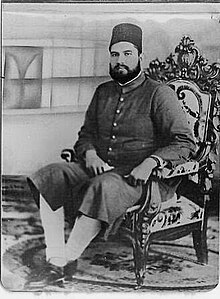Bahadur Yar Jung
| Bahadur Yar Jung | |
|---|---|
 |
|
| Born |
Muhammad Bahadur Khan 3 February 1905 Hyderabad, Hyderabad Deccan |
| Died | 25 June 1944 (aged 39) Hyderabad, Hyderabad Deccan |
| Cause of death | Suspected poisoned; his hukka was poisoned when he went to meet the opposition party. |
| Resting place | Mushirabad, Hyderabad, India |
| Nationality | British India |
| Other names | Quaid-e-Millat, Bahadur Yar Jung |
| Alma mater | Madarsay Darul-Uloom now City College Hyderabad |
| Known for | Prominent figure of Pakistan Movement, who propounded the philosophy of Sharia Law and Muslim State. Associated with: Majlis-e-Ittehadul Muslimeen Muslim League Khaksar Tehrik |
| Political party |
Majlis-e-Ittehadul Muslimeen Muslim League Khaksar Tehrik |
| Spouse(s) | Talmain Khatoon |
| Parent(s) | Khatoon (mother) Nawab Naseer Yar Jung (father) |
Nawab Bahadur Yar Jung (or Bahadur Yar Jang) (3 February 1905, Hyderabad – 25 June 1944) (Urdu: بہادر یار جنگ) was a foremost Muslim leader in the princely state of Hyderabad in British India. He founded the branches of Tablighi Jamaat and Khaksars in Hyderabad and was known as a powerful religious preacher. In 1938, he was elected the President of Majlis-e-Ittehadul Muslimeen, a position in which he served till his death.
Particularly, he wanted his own home state, Princely Hyderabad, to be separate from the rest of India as a Islamic/Muslim state with Sharia Law in force. He led an organisation called Majlis-e-Ittehadul Muslimeen, for the propagation of Islam. A friend and aid to Mohammed Iqbal and Muhammad Ali Jinnah, he was one of the most admired leaders of the Pakistan Movement. In 1926 Bahadur Yar Jung was elected president of the Society of Mahdavis. In 1927 he led an organisation called Majlis-e-Ittehadul Muslimeen, of which he was the founder member. In 1930 he was elected secretary of the Union of Jagirdars which had been established in 1892 but was moribund. A great Muslim zealot, he advocated love and brought about views which are largely appreciated and read about today. He was a great author and a devoted Muslim.
Matched by very few, his oratory skills served as a catalyst to the independence struggle.
...
Wikipedia
